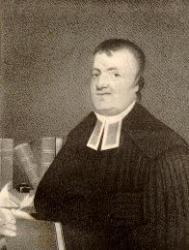|
Short Name: |
Jeremy Belknap |
|
Full Name: |
Belknap, Jeremy, 1744-1798 |
|
Birth Year: |
1744 |
|
Death Year: |
1798 |
Belknap, Jeremy. (Boston, Massachusetts, June 4, 1744--June 20, 1798, Boston). He graduated from Harvard College in 1762; taught school for four years; in 1766 accepted a position as assistant to Rev. Jonathan Cushing of Dover, New Hampshire, and in 1767 was ordained, serving in that parish until 1786. In 1787 he became minister of the Federal Street Church (now the Arlington Street Church), Boston, which he served until his death. Harvard gave him the honorary degree of Doctor of Divinity in 1792. He was the author of a three-volume History of New Hapmshire; of a petition (1788) for the abolition of the slave trade; and of other books and essays; and formed the plan for the Massachusetts Historical Society, organized in 1791. He wrote no hymns but made an important contribution to American hymnody in his collection Sacred Poetry: consisting of Psalms and Hymns adapted to Christian devotion in public and private. Selected from the best authors, with variations and additions (Boston, 1795), which ran to many editions. His intention was to provide a book acceptable to both the conservative and the liberal wings of Congregationalism, to bridge the widening gap which resulted in the formation of the Unitarian denomination a generation later. In this he failed, for only the liberal churches accepted it, though it was widely used by them for 40 years, being much of the best of the period. It includes 300 hymns from the best English sources, and was the first to introduce to Americans the hymns by Anne Steele. The only American hymns in the collection are Jacob Kimball's metrical version of Psalm 65 and Mather Byles' "When wild confusion rends the air."
--Henry Wilder Foote, DNAH Archives
Jeremy Belknap (June 4, 1744 – June 20, 1798) was an American clergyman and historian. His great achievement was the History of New Hampshire, published in three volumes between 1784 and 1792. This work is the first modern history written by an American, embodying a new rigor in research, annotation, and reporting.
Wikipedia Biography



 My Starred Hymns
My Starred Hymns


